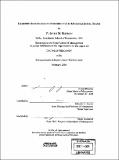Learning strategies and performance in organizational teams
Author(s)
Bresman, Henrik M
DownloadFull printable version (6.711Mb)
Other Contributors
Sloan School of Management.
Advisor
Deborah G. Ancona.
Terms of use
Metadata
Show full item recordAbstract
(cont.) shows that vicarious learning is positively associated with performance. I argue that vicarious team learning is an under-explored dimension of what makes teams and organizations competitive. The chapter concludes by pointing toward a contingency theory of team learning in which the effectiveness of a team learning strategy depends on characteristics in the team's task environment. This dissertation addresses the subject of team learning strategies and their performance effects in three independent but related chapters. A common theme is the notion that theorizing about team learning as constituted by a set of distinct strategies can improve our understanding of how teams learn, and how it influences performance. The first chapter explores team learning in an inductive study of six teams in one large pharmaceutical firm. I find that many of these teams engage in vicarious team learning--the activities by which a team learns key aspects of its task from the similar experiences of others outside the team--rather than experiential team learning. I detail the nature of vicarious team learning in a model including three component processes: identification, translation, and application. The second chapter reviews the literature on team learning and concludes that it has largely been treated as a uniform construct. Drawing on organizational learning theory, social learning theory, and the literature on the management of innovation and entrepreneurship, I propose that teams learn by deploying at least three different strategies: experiential learning, contextual learning, and vicarious learning. I use the example of a team facing a particularly difficult learning environment to illustrate the significance of viewing team learning as a multi-dimensional construct. The final chapter examines different team learning strategies, and vicarious learning in particular, as a means to understanding learning and performance differences across teams. Vicarious learning is conceptualized as an integral part of how teams learn. A field study of 43 teams in the pharmaceutical industry is used to develop and test the construct and
Description
Thesis (Ph. D.)--Massachusetts Institute of Technology, Sloan School of Management, February 2005. Includes bibliographical references (leaves 97-103).
Date issued
2005Department
Sloan School of ManagementPublisher
Massachusetts Institute of Technology
Keywords
Sloan School of Management.